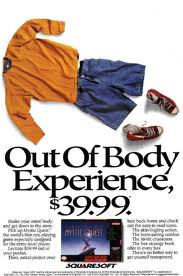By Chad Denton

Wasn’t the ad campaign for this game a horrible lie, even by the standards of ad campaigns?
Okay, okay, I’m going to come out and admit that it’s not fair to call Final Fantasy: Mystic Quest a bad game, not in a strict sense anyway. It set out to provide a basic, watered-down introduction to console RPGs and, honestly, it achieved that goal quite well. But at the same time it represented what was probably the most condescending message a company ever made to its own fanbase. Square was basically proclaiming to Americans, you all can’t handle our real product (which in this case would be Final Fantasy V) so we’re going to give you a version that’s more up to your speed – and that speed would be somewhere along the lines of a golf cart with a defective engine. Hell, when they released the game in Japan they even titled it Final Fantasy USA. Square might as well have subtitled it “This is what Americans think a RPG should be! Ha ha! They embarrass us by buying our games!”
Now I’m sure there were other elements to Square’s decision. Like the ad emphasizes, Final Fantasy: Mystic Quest was also cheaper, selling for $40 at a time when most RPGs for the Super Nintendo ran in the $50 – $60 range. But, trust me, you could see where you saved that money. The game didn’t even have its own graphical signature; most of the graphics were souped-up and colorized from Final Fantasy Legend III. You could also pretty much beat the entire game in a day or two of even casual playing, which was great if – like me – you made a habit out of renting video games and even RPGs for the weekend (P.S. I still curse the assholes who always erased my saved games when they rented the games before I could!), but not so good if you bought it expecting something like the 40 hour minimum players could expect to put into Final Fantasy IV. Continue reading Trash Culture’s Final Fantasy Retrospective Part 5: Mystic Quest


 Except for “Choose Your Own Adventure” books, I can’t think of any trash culture reading materials that were more ubiquitous among my generation. The “Worlds of Power” books were designed by Seth “F.X. Nine” Godin and his shadowy legion of ghostwriters for one reason: to make money, obviously, but also I think they were a sincere attempt to get young gamers into reading. Honestly, at the time, it wasn’t a bad idea. Nowadays, no matter what the snobs say, video games have for the most part come into their own as a storytelling medium. It’s arguably futile to translate something like Final Fantasy VII or Silent Hill 3 into literature, since games like those are able to convey narratives on their own and those narratives are intertwined with, say, the dread that comes from exploring the “Otherworld” or the sense of determination the player might feel in facing Sephiroth after hours of seeing Cloud tortured in nearly every possible sense by the villain.
Except for “Choose Your Own Adventure” books, I can’t think of any trash culture reading materials that were more ubiquitous among my generation. The “Worlds of Power” books were designed by Seth “F.X. Nine” Godin and his shadowy legion of ghostwriters for one reason: to make money, obviously, but also I think they were a sincere attempt to get young gamers into reading. Honestly, at the time, it wasn’t a bad idea. Nowadays, no matter what the snobs say, video games have for the most part come into their own as a storytelling medium. It’s arguably futile to translate something like Final Fantasy VII or Silent Hill 3 into literature, since games like those are able to convey narratives on their own and those narratives are intertwined with, say, the dread that comes from exploring the “Otherworld” or the sense of determination the player might feel in facing Sephiroth after hours of seeing Cloud tortured in nearly every possible sense by the villain. 